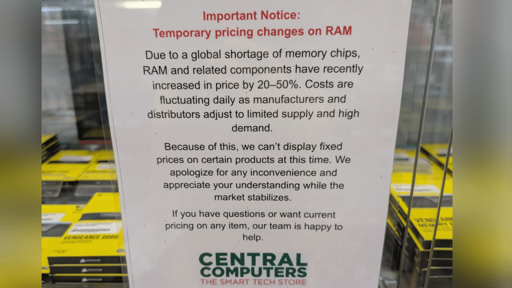Generative “AI” data centers are gobbling up trillions of dollars in capital, not to mention heating up the planet like a microwave. As a result there’s a capacity crunch on memory production, shooting the prices for RAM sky high, over 100 percent in the last few months alone. Multiple stores are tired of adjusting the prices day to day, and won’t even display them. You find out how much it costs at checkout.



https://en.wikipedia.org/wiki/Zram
Open-source RAM is better.
Using a RAM drive for swap?
Am I misunderstanding the point of swap?
It’s a compressed RAM drive being used as swap backing. The kernel’s already got the functionality to have multiple tiers of priority for storage; this just leverages that. Like, you have uncompressed memory, it gets exhausted and you push some out to compressed memory, that gets exhausted and you push it out to swap on NVMe or something, etc.
Kinda like RAM Doubler of yesteryear, same sort of thing.
Zram on Linux is awesome! I’ve used it heavily in both memory constrained systems and systems with 16+GB of memory running very poorly optimized code
Running for example, Cities Skylines with 40GB of mods can easily lead to running memory usage being 20-30GB uncompressed. With zram I can load that same mod load out on a 16GB laptop with no swap and it won’t crash where it would crash for being out of memory before.
Another example is Proxmox with over-provisioned lxc containers. Since it’s still the kernel scheduler running all of the processes in those containers zram can keep them all running nicely even when a heavily modded Minecraft server gets a few players online and starts pushing past memory limits, where before I set it up I’d have some of the Minecraft server processes get killed to free up memory resources without warning or proper logging by Minecraft
Edit to add: my daughter’s first laptop has only 4GB of memory and runs a decade old Celeron booting from a spinning hard drive, the definition of budget ewaste. Zram makes it so it’s CPU limited running Minecraft rather than memory limited!
Thanks for the added insights! I haven’t used it myself, so appreciated.
Linux has a second, similar “compressed memory” feature called zswap. This guy has used both, and thinks that if someone is using a system with NVMe, that zswap is preferable.
https://linuxblog.io/zswap-better-than-zram/
Based on his take, zram is probably a better choice for that rotational-disk Celeron, but if you’re running Cities: Skylines on newer hardware, I’m wondering if zswap might be more advantageous.
Huh I’d never looked into that! Thank you!
I mostly used zram because there’s an easy-peasy script in the Debian repos making it dead simple to setup and never looked deeper into it